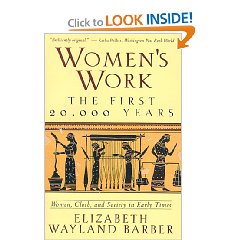Career Women of the Bible Sneak Peak: The Woman Who Wasn't Deceived
“Adam was not deceived, but the woman was deceived and became a transgressor” (2 Timothy 2:14). For two millenia this verse has been used as an excuse to keep women out of leadership positions in the church and under the rule of men. Even today fundamental groups use this verse to proof text their belief that women are more easily deceived than man and therefore, can’t be trusted to be leaders or even make decisions in their own homes about their own families. But three books after this verse in 1 Timothy, we meet a woman who was entrusted to make sure that the church she was the pastor of was not deceived by those touting false doctrine. Here is another sneak peak from Career Women of the Bible about a woman you never learned about in Sunday School or sermons: The Elect Lady of 2 John.
Church Overseers: The Elect Lady
She fell more than sat on the cushions after sending yet another charlatan out of her house. This one yelling that she was betraying the Messiah and would burn in hell forever for not accepting the stranger and his perverted version of the Gospel. She had the impression he was more disappointed in losing the luxuries her house could provide than losing the opportunity to teach. When she first opened her house for the church, there were not that many false preachers or people in it just to see what they could mooch off of her. Most of the itinerant preachers and evangelists were good honest people who really did want to tell the simple truth of Jesus Christ the Messiah. How he loved us all and loved to the point of death. How God in love raised Jesus back from the dead, and how Jesus’ followers were now to share that same love with everyone they met. She also missed the missionary couples who used to be more frequent visitors at her door. More and more the itinerant preachers were men who were single. And more and more of them were preaching against marriage because of the imminent return of Jesus. A servant came into the room with a young man who looked like he had just gotten off the road. She sighed. Another one. She rose to her feet, and said, “What can I do for you?” The man handed her a letter. “This is from the Elder,” the man said, “he told me to get it here as quickly as I could.” Her face lit up in a smile. Another believer, and better than that one from the Elder. She told her servant to get refreshments for the young man then bade the man to sit and tell her all about her old friend.
In John’s second epistle we meet another woman who is a church overseer, the elect lady: “The elder to the elect lady* and her children, whom I love in the truth,” (2 John 1). John wrote the elect lady to continue doing what she learned so long ago: “I ask you, not as though I were writing you a new commandment, but one we have had from the beginning, let us love one another. And this is love, that we walk according to his commandments; this is the commandment just as you have heard it from the beginning–you must walk in it” (2 John 5-6). But he also warned her of deceivers that were trying to convince people Jesus never had a physical body, and not to let them into her house to deceive the church that met there. She was the one who safeguarded the flock of Jesus in her city, and the Elder trusted her to discern the deceivers from true followers of Christ and not let them confuse or lead astray any who meet in her house.
The phrase “elect lady” is an interesting one. “Lady” is used to translate the Greek word kuria, and this is the only time it appears in the New Testament (vv. 1, 5). Its male counterpart is kurios, which is translated as “lord” or “master.” The male form refers to the head of the household, a guardian, or trustee (See Galatians 4:1 where Paul used the word to describe someone who owned an estate and was a guardian or overseer). People who owned and oversaw slaves were also called kurios. Not only is this woman a lady with authority but she is eklektos: she has been called or chosen for her position of authority. In Beyond the Curse, Aida Besançon Spencer gives “elect lady” an alternate translation: “the woman chosen to be master” (p. 109). This woman is called “master” and “chosen,” and she is given instructions to safeguard the church against false teachings.
For centuries the church has told women that we are much easier to deceive than men because of one verse in Bible: “Adam was not deceived, but the woman was deceived and became a transgressor” (2 Timothy 2:14). It doesn’t matter that the writer of this epistle was giving instructions to a problematic congregation that was having trouble figuring out what being a Christian met, let alone living like one. It doesn’t matter that this verse is only one verse in the entire Bible, and that the Bible has quite a bit to say about wise women who made better decisions than the men in their lives did. Oh no this verse is in the Bible and therefore has to be taken literally for all time, amen.
But two books after 1 Timothy in 2 John we find a letter addressed to a woman encouraging her not to let false doctrine infiltrate the church meeting in her home. From the beginning of the church women guarded the church from those who would deceive the church, like the Elect Lady and Priscilla. Women today are called to do the same thing in their churches.
* There is a debate about who the elect lady is. Is she the overseer of the church or is “elect lady” a metaphor for the church? It would be redundant to address the church twice as “elect lady and her children.” In both 1 and 2 John, “the elder” uses “children” to designate the church he is writing to (1 Jn. 2:1). “Elect lady” is singular and “children” are plural also pointing to different set(s) of people. In 3 John the almost identical greeting is given as 2 John: “The elder to the beloved Gaius, whom I love in truth” (v. 1). Given the uniformity of John’s writing the elect lady then would be the overseer of a church that met in her house.
Related Post
Career Women of the Bible: Church Overseers, Ministers and Patrons
 Happy Friday Company Girls! The coffee is on and hot!
Happy Friday Company Girls! The coffee is on and hot!
